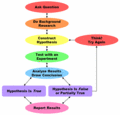Suggested Research
This page is meant to list possible experiments researchers could do. All types of science goes in, statistical, theoretical, or otherwise. Got an idea, but not the time/energy/motivation? Add it in.
Biology
Theory tested: Jungle grows faster when next to dense jungle.
Scale: Medium
Risk: Medium-Low
Time Use: High
AP Use: Low
Go to a islet such as those near Durham and York, or to a small peninsula such as this. Clear cut half the islet/the whole peninsula. For as far out as your remaining AP allows/the rest of the islet, chop the surrounding jungle to a specific density. Record the jungle growth in multiple graphs, one per change.
Theory tested: There are specific spaces of grassland that will always be grassland.
Scale: Large
Risk: Medium-Low
Time Use: High
AP Use: Medium-High
Attempt to destroy a patch of grassland via watering nearby jungle. On a chart, record the day each grassland disappears. (For a rough rate of destruction.) If you reach a point as which It comes to a halt or a single space is isolated, you've got yourself some evidence.
Objectology
Otherology
Research Tips & Tricks
- Follow the scientific method.
- Ask a Question
- Do Background Research
- Construct a Hypothesis(optinal)
- Test Your Hypothesis by Doing an Experiment
- Analyze Your Data and Draw a Conclusion
- Communicate Your Results
- Record as much data as possible. Charms, date, location, etc. What may seem irrelevant today may be proven a variable tomorrow.
- It is important for you to change only one variable and keep all other conditions the same.
- Repeat your experiment several times to make sure that the first results weren't just an accident.
- Rather than starting from scratch in putting together a plan for answering your question, you want to be a savvy researcher using the pages such as Theorems to help you find the best way to do things and insure that you don't repeat mistakes from the past.
- Record your data in your character profile(or similar location), premade chart, or in a talk page about something in which the data is relevant.
